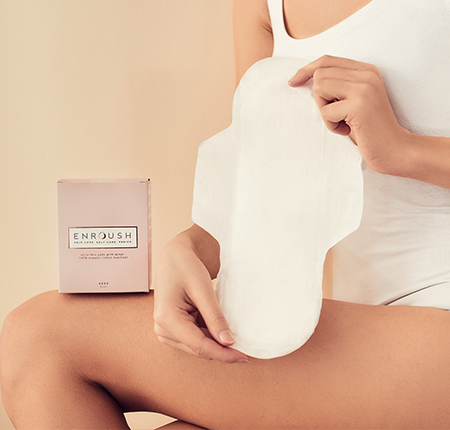
International Ovarian Cancer Day
What do we know about ovarian cancer? How do we spot it, what are the signs to look out for, and why did we choose to talk about this topic today?
It is a health problem that often goes easily unnoticed in its early stages. But did you know that in Romania, ovarian cancer is on the 8th place in the list of the most common types of cancer affecting women?
The good news is that there are things you can do to reduce your risk of ovarian cancer, or detect and treat it early. May 8, officially declared International Ovarian Cancer Day, gives us the perfect opportunity for an open conversation to raise awareness of the seriousness of ovarian cancer and talk about how the right information, attention and care can save your life.
May 8 is International Ovarian Cancer Day
At the initiative of the World Coalition for Ovarian Cancer, May 8 has been officially declared World Ovarian Cancer Day since 2013. In short, we dedicate May 8 to people all over the world who are fighting ovarian cancer and their families, and raise the alarm about the seriousness of the condition.

What alarm signal are we raising on this occasion?
The points that it brings to the fore and the results that the international day against cancer aims at are:
Awareness: It is a real problem that causes more deaths than any other form of cancer in the female reproductive system.
Information and education: the low number of ovarian cancer symptoms and signs leads to their being ignored; recognizing them encourages us to pay attention and identify them.
Solidarity: We show support for women battling ovarian cancer and their families.
Encouraging research: difficult and late diagnosis affects the survival rate, and from May 8 we encourage researchers to continue studies to find more effective and more ways to diagnose ovarian cancer early.
The vision of the day is awareness. Which leads to actions, actions that can ultimately save lives. And solidarity and education are key words in this movement, which started precisely from the desire to support women who are already fighting ovarian cancer and to encourage education, attention and early prevention.
What do you need to know about ovarian cancer?
Naturally, in your body, in the pelvic area, there are two ovaries that produce eggs. There are also the two fallopian tubes, through which the eggs reach the ovaries to the uterus. These are the organs mainly affected when you get ovarian cancer.
Although any woman can get ovarian cancer, it occurs most often in people over the age of 50, and it is often genetic. Let's see everything there is to know about causes, types, symptoms and treatment.
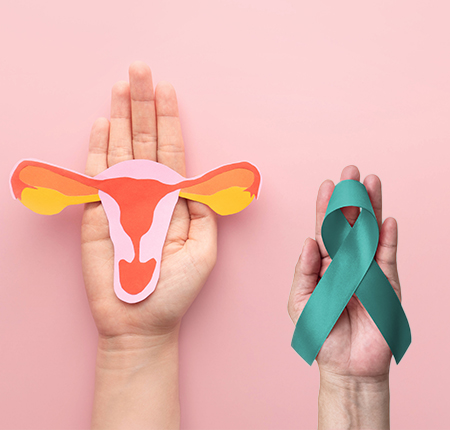
Types of ovarian cancer
Ovarian cancer can occur in a variety of tumors, and these are divided into types and subtypes. There are many, but here are some important aspects:
Epithelial ovarian cancer is the most common type of ovarian cancer and affects the outer surface of the ovaries in 85-90% of cases.
Germ cell tumors account for less than 2% of ovarian cancers and are the most common in teenage girls and young women in their 20s.
Stromal tumors represent approx. 1% of ovarian cancers and can often be detected early because vaginal bleeding occurs, the most common sign.
Serous adenocarcinoma is the most common subtype of ovarian cancer, with tumors that grow aggressively.
Ovarian cancer signs and symptoms
Unfortunately, a major cause of high mortality in ovarian cancer patients is late detection. Ovarian cancer does not have obvious symptoms: they are subtle and very easy to overlook, which is why you go to the doctor in advanced stages.
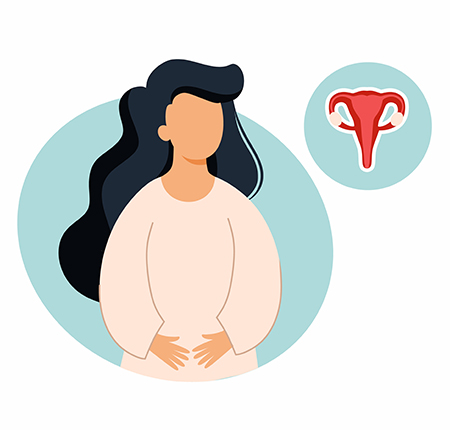
The most common symptoms of ovarian cancer are:
Feeling of bloating or constipation
Lack of appetite or feeling full immediately
Abdominal/pelvic pain or tenderness
Frequent and urgent need to urinate
Vaginal bleeding after menopause
Fatigue or asthenia
Indigestion
Back pain
Weight loss
That's why it's very important to pay attention to all the signals your body gives you, and to discuss with your gynecologist even seemingly harmless changes. Because early ovarian cancer testing, diagnosis and treatment can save your life.
Ovarian cancer - Causes
Doctors and researchers do not know exactly what the causes are, the field is still an object of study. But anyone who has ovaries can develop ovarian cancer. The risk increases with age, especially after age 50, or if:
- You have inherited certain BRCA1 or BRCA2 gene mutations.
- Suffer from endometriosis or diabetes;
- You started your menstrual cycle very early;
- You started menopause after the age of 55;
- You have already had breast cancer, colon cancer or another type of cancer;
- You are overweight;
- You smoke.
The most effective way to reduce the risk of ovarian cancer is through a healthy lifestyle. Quit smoking, maintain a healthy weight, and don't forget regular visits and tests - especially if your mother, sister or other family members have already been affected.
Ovarian cancer treatment
The main forms of treatment are chemotherapy and surgery. But your doctor will prescribe treatment based on what type of ovarian cancer you have, the size and location of the tumor, your general health, and whether it has spread to other organs.
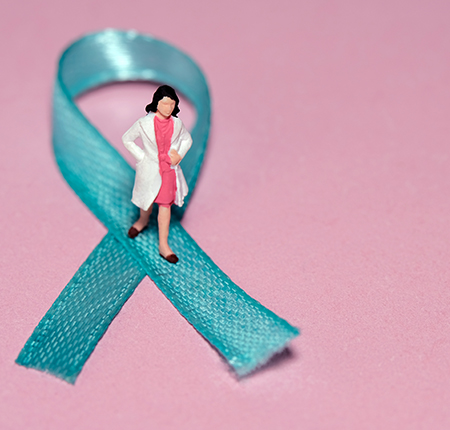
Current treatment options include:
Surgery: If caught early, ovarian cancer can be treated with surgery to remove both ovaries and fallopian tubes, or all affected organs.
Chemotherapy: consists of drugs that kill cancer cells and can be given before/after surgery, or on its own without surgery.
Targeted therapy: consists of drugs that target only what supports the growth and survival of cancer cells.
Radiotherapy: Uses X-ray radiation to destroy cancer cells.
Hormone therapy: Estrogen production supports the growth of cancer cells, and hormone treatment can block this production to stop the cancer.
Can you prevent ovarian cancer?
There are currently no known safe ways to prevent ovarian cancer, other than reducing the risk with a healthy lifestyle. That is why it is an area where further research is absolutely necessary. 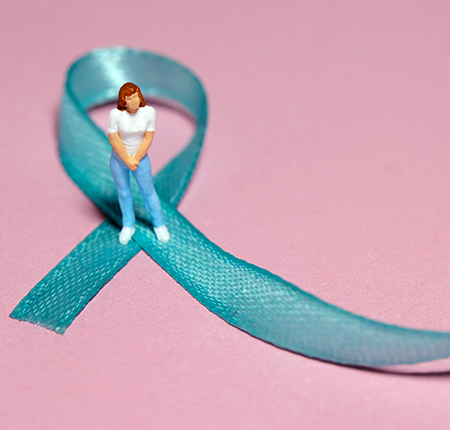
What we do know so far, however, is that the best thing you can do is listen to your body and protect it. How can you do that?
Periodic visits to the gynecologist: during the examination, the gynecologist palpates the ovaries and notices whether they are enlarged or tender, indicating ovarian tumors and signaling that more investigations are needed. Not all tumors can be detected this way, especially in the early stages, but it is an excellent initial method of discovering any type of cancer of the reproductive system. Thus investigations can be continued for immediate diagnosis and treatment.
Healthy menstrual products: protecting your body and taking care of your intimate area is extremely important for your health. Conventional tampons and pads are often full of plastic, chemicals and carcinogens that make you sick. Enroush 100% organic cotton tampons and natural menstrual products support your reproductive health with only pure ingredients

Breastfeeding: According to 2020 studies, giving birth and breastfeeding were associated with a reduced risk of developing ovarian cancer, and prolonged breastfeeding led to an even greater decrease in risk.
How does ovarian cancer affect your period?
Ovarian cancer itself does not stop menstruation. In theory you can still menstruate even when the tumor is in your body. But because it primarily affects your ovaries responsible for ovulation, certainly any type of ovarian cancer can also affect your menstrual cycle.
It may cause you to have irregular periods with irregular bleeding or heavy flow. With a mission to provide you with the best period care, at Enroush we've created super-absorbent organic pads that will take on the challenge of heavy flow, standing by you through difficult periods while battling ovarian cancer.
We care about your health and are making our voices heard on World Ovarian Cancer Day
The most impactful thing we can do is break the silence around ovarian cancer. The Enroush community has been concerned with women's health above all else since the beginning, and we're glad we were able to touch on that topic on International Ovarian Cancer Day.
And our readers certainly know that efforts don't stop here on the page, but are complemented by the rest of Enroush's mission. To make menstrual care and the health of the female reproductive system accessible to as many women as possible.
Both in the prevention of ovarian cancer and dozens of other conditions of the intimate area, it is essential to know what comes into contact with our body. That's why we created our products from 100% GOTS certified organic cotton with the clean label. So that you know everything you put into your body when you use a tampon, and everything that touches you when you put on an absorbent pad. I told in more detail about the benefits of organic absorbents HERE .
By talking about intimate issues and menstrual health, each of us can contribute to a healthier world for women. We'd love for you to join the Enroush community, and we hope to see you on social media as well, where every share counts to help our message and talk about ovarian cancer reach as many people as possible!
